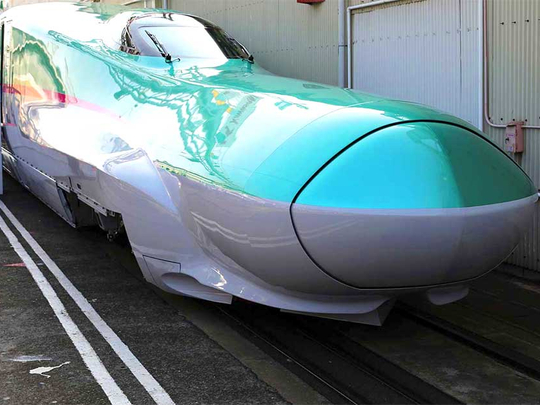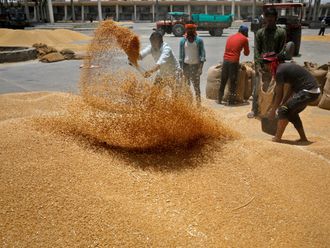
AHMEDABAD, India: India's first bullet train project, a $19-billion initiative linking Ahmedabad to Mumbai, was launched Thursday as Indian Prime Minister Narendra Modi and Japanese counterpart Shinzo Abe hailed fast-growing ties between Asia's two biggest democracies.
The project is seen as emblematic of warming relations between New Delhi and Tokyo, who are seeking to combat China's growing regional influence.
The high-speed link, which will use Japanese technology to connect the main city of Modi's home state with India's financial capital, is scheduled for completion by December 2023.
"I hope to enjoy the beauty of India through the windows of the bullet train with Modi on my side when I come to India in a few years," Abe told a ceremony in Ahmedabad.
"It marks the beginning of a new chapter in ties between India and Japan," he added.
"The Indo-Japan relationship is not just about bilateral trade. It has developed into a strategic and global partnership in the Indian-Pacific region," Abe said.
His visit comes just after a border standoff between India and China in a disputed and strategically important Himalayan area.
Local media reports said Japan was likely to take up the sale of ShinMaywa US-2 amphibious aircraft that India has been interested in for several years.
The aircraft is expected to boost India's maritime capabilities.
India and Japanese PMs Modi and Abe hail fast-growing ties between Asia's two biggest democracies https://t.co/ZX3IIYWfHW pic.twitter.com/OcAReA9NkD
— AFP news agency (@AFP) September 14, 2017
Modi welcomed Abe at the airport with his traditional big hug before the Japanese premier and his wife changed into traditional Indian dress.
Japan is providing 85 percent of the cost of the new train link in soft loans.
At a glance
The ambitious $19 billion Ahmedabad-Mumbai line adds to the growing list of major India-Japan infrastructure cooperation projects.
The line will cover 508 kilometres.
The operating speed of the bullet train would be 320 kph and the maximum speed would be 350 kph.
Twelve stations
Proposed stations include Mumbai, Thane, Virar, Boisar, Vapi, Bilimora, Surat, Bharuch, Vadodara, Anand, Ahmedabad and Sabarmati.
The distance will be covered in two hours and seven minutes if the train stops at four stations -- Ahmedabad, Vadodara, Surat and Mumbai.
If the train stops at all 12 stations, it will cover the distance in two hours and fifty-eight minutes.
Completion date: 2022.
Area: About 825 hectares of land would be acquired for the project.
Of the 508 km stretch, 92 per cent (468 km) of the route will be elevated, six per cent (27 km) in tunnels and the remaining two per cent (13 km) will be on the ground.
The high speed train would also pass through the country's longest tunnel of 21 km, of which 7 km will be under the sea.
Development booster
The bullet train project is expected to help the country's development, said the two leaders
Modi said no country can grow if they don't dream big, adding: "To grow, one needs to expand his dreams and decide his strength to achieve that. It's new India which has to fly high."
In his remarks, Abe said "a strong India is in Japan's interest, and a strong Japan is in India's interest. Today, on this day, that part of the bright future is seen in solid form."
Shinkansen Technology, which will power India's bullet train project, has changed Japan's country's economy, society and people's lives, said Abe.
Modi said that with the foundation laying of the project India has fulfilled its very old dream.
Job generator
"Bullet train will bring employment as well as speed. The Bullet train project is human friendly and eco friendly."
Modi also expressed gratitude to Japan for providing technology and financial assistance of Rs 88,000 crore at 0.1 per cent interest.
Abe in his speech praised Modi as a "farsighted leader".
"My good friend Prime Minister Narendra Modi is a farsighted leader. And he took a decision two years ago to bring high speed rail in India and to create a New India. And then our country decided to fully support Modi's vision, culminating in the progress of the project," the Japanese Prime Minister said.
Besides Modi and Abe, Railway Minister Piyush Goyal, Minister of State for Railways Manoj Sinha, Gujarat Governor O.P. Kohli, Gujarat Chief Minister Vijay Rupani and Maharashtra Chief Minister Devendra Fadnavis were also present.











